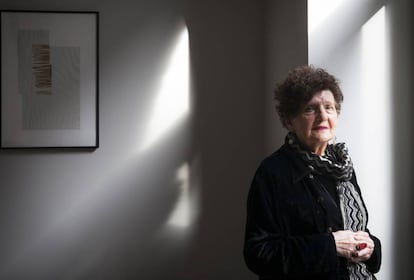The Mexican writer Margo Glantz, in 2019, in Madrid.Santi Burgos
An elongated nose;
hair that grows wide and not long;
an incipient hump.
Pieces of her body that disturbed Margo Glantz since she was a girl.
The 91-year-old Mexican writer, academic, teacher, tweeter, writes about what haunts her, the body: wounded, martyred, mutilated;
erotic, rehabilitated.
The Sexto Piso publishing house has just brought together in the book
Body against Body
some of the essays in which the author delves into this theme that pursues her.
They are long, short, academic, intimate texts, a part of Glantz's extensive bibliography, who was not labeled as a writer until she was 47 years old.
“They called me an academic, a teacher, a cultural broadcaster ... but they didn't call me a writer because I hadn't written fiction.
Writing essays and writing fiction is equally valid ”, he claims in an interview with EL PAÍS by videoconference from his home.
Confinement frustrates her, she says, but recognizes her virtues.
During the covid-19 pandemic, she kept a daily chat with dozens of people about the Greek tragedy and now participates in a course on the validity of the essay
A room of my own
, by Virginia Woolf, where the American defends that women should have money and a room of his own "to be able to write novels."
Glantz, sharp, talkative and combative, replies: "Women do not yet have our own bodies."
Question.
In the essays now compiled, he associates a foot, a hand, or the tongue with unexpected themes such as the Conquest or Henry Miller.
How do you get there?
Answer.
I have obsessions and those obsessions fragment the text and the body.
When I go to a specialist doctor, for example, an ophthalmologist, and he cannot see me because he takes care of the retina, I have to go with the one who takes care of the upper eyelid or the cornea or the tear ducts.
Doctors fragment their specialization and it bothers me deeply, which should not happen because I fragment the body in my essays.
Right now I'm thinking about it ... Sometimes that fragmentation seems aberrant to me, and yet I go to it in my texts.
I should be a little more consistent.
Q.
Actually, I wanted to ask you how your head works.
R.
When I work on a text I see how the text will function narratively based on actions, but also emblems, narrative elements that apparently do not narrate anything, they simply confirm something.
I find it very interesting how a writer can transfer a fundamental element of the text to such unimportant objects.
[French writer] Annie Ernaux has a book on abortion that I worked on with great care.
The moment she arrives at the room of the woman who is going to clandestinely perform an abortion, she notices something completely elementary: there is a container with boiling water and a red probe that looks like a snake, she says, and next to that container is a hairbrush.
This absolutely banal detail becomes extremely important in the book.
When I do my essays or my fictions, there are certain elements of the body that worried me as a child and adolescent.
Q.
Like which ones?
R.
The face I had, the nose, how I stooped and how my body contrasted with the body of movie stars.
I was looking at the hair, which did not grow normally, it grew in width not length.
It was an absolute obsession.
And when I get to work, those obsessions take on a body.
A very complete textual body, very harmonious, but they refer to a fragment of the body.
It is mutilating the body to be able to talk about it.
Q.
Why is the Malinche language [Nahua interpreter of the Spanish conquerors] or the nudity of a prisoner in an extermination camp in this book?
R.
They are united by the obsession I have for those fragments.
When they arrived at the concentration camps, the men and women were in the most absolute nakedness.
They shaved them, but shaving the pubic hair of women and leaving them hairless was one of the most embarrassing elements for them, much more than for men.
It has been instilled that women have to have a very special modesty with their sex.
The mechanism that works in the concentration camps is very different from the one that works in [Hernán] Cortés in
La Malinche: the tongue in the hand
, but there is a relationship with the mutilation of the body.
Q.
In a conversation like this, by Zoom, we see nothing but heads, torsos and hands, and we even see our own image.
What link are we having with our bodies in the pandemic?
R.
It is a body without a body, right?
Instead of “against body” it is “body does not find body”.
Q.
What do you mean?
R. I
find a photo, but I can't find a body.
I see you, I hear your voice, I see how you move your lips, you see me the same, perhaps a little deformed because the Zoom deforms the faces.
We see a fragment of the room.
But we do not see more than a part of our bodies.
It may be that, if we see each other bodily, a face-to-face meeting as it is called now, we will recognize ourselves.
But it is a bit frustrating, or quite frustrating, as the whole confinement has been in general.
Q. You
said a few years ago that you did not start writing until you were 47 years old, why not before?
A.
I have been very clumsy in saying that the first book I published was at 47. I published several books when I was 30 years old, but about essays.
I published many newspaper articles, published my university papers ... There are already many elements of what would later become my writing.
For me, writing an essay is so extraordinary, it has so much literary value, like a fiction.
But I didn't dare to publish fiction until I was 47 years old.
Before they called me an academic, a teacher, a cultural broadcaster, but they didn't call me a writer because I hadn't written fiction.
There is also a prejudice in that sense, a prejudice in which I have very completely fallen.
P.
Why had not been encouraged?
R.
I did not write more than what they forced me to write: the doctoral thesis, the master's thesis, etc.
When I started writing fiction, I wrote very short little fictions, almost like aphorisms.
When I gave my texts to friends of mine, older than me, they told me: “They are interesting texts, but like individual accounts.
As long as you do not know how to string your accounts well, you cannot be a writer ”.
Q.
You were a shy young woman, how did you start writing about sex or eroticism?
A.
When I started writing fictions, I decided that I didn't give a damn what other people thought.
That was what I was interested in writing.
When I wrote
Apparitions
, which is a book where sexuality is very open and I connect it with mysticism, there was a lot of scandal.
They told me how was it possible that I wrote those texts, that I had the face of a good girl.
When [Georges] Bataille published
The History of the Eye, he
had to publish it under a pseudonym;
the Marquis de Sade suffered severe persecution.
For writing books where the sexual was excessively open.
Now, for a woman to write them was more violent.
When I translated
The Story of the Eye
, a friend of mine said that I had made a “pernia-open” translation, thereby denigrating me, telling me that I was making love with the text.
Which, when translating it, I was taking.
P.
Do you see more authors in bookstores?
R.
More and more.
In Spain, the number of women who are writing well is impressive.
And women as daring as Cristina Morales.
Mona Ojeda, who is Ecuadorian.
And many Argentines, like Mariana Enriquez.
Before, there were almost no female writers in Paraguay, in Ecuador, in Bolivia, and now there are great people.
In Mexico, the same.
It also happens in the United States and Canada.
Without this meaning that there is absolute freedom.
That freedom can be constantly threatened.
We must be vigilant.
Q.
When did you become a feminist?
A.
I have always been.
From the first moment I saw that men wrote in a way about the female body.
Q.
Do you think that women are more owners of our bodies?
A.
In Mexico, only Mexico City and Oaxaca allow abortion and there were other states in which abortion was allowed, but little by little the laws have been closed.
In Argentina, they had to fight for years, the same happened in France, in England ... In the United States there are constantly evangelistic demonstrations against the clinics in the States where abortion is allowed.
I should not talk about abortion because obviously I am no longer going to have an abortion, but it is very important that the youngest do not have to have clandestine abortions, that they do not put them in jail or defame them.
We have not yet managed to have our own body.
As [Simone] De Beauvoir said, any political, cultural, or religious change will attack the female body.
Subscribe here
to the
newsletter
of EL PAÍS México and receive all the informative keys of the current situation of this country








